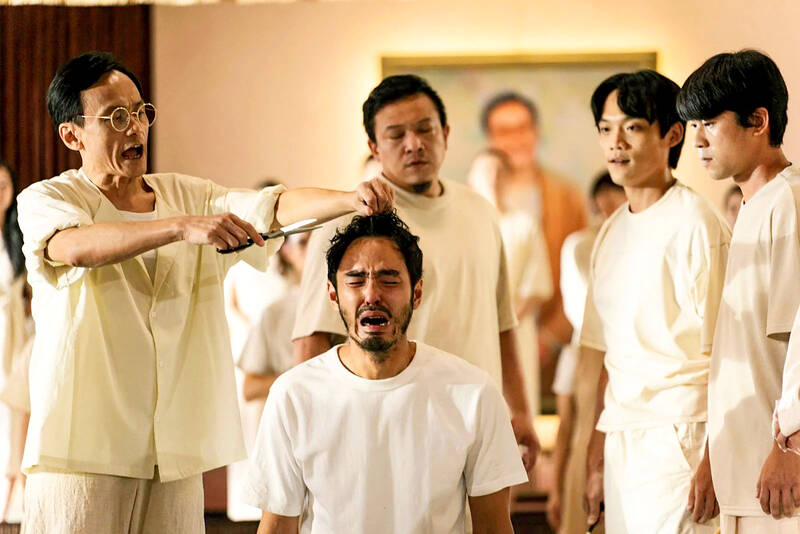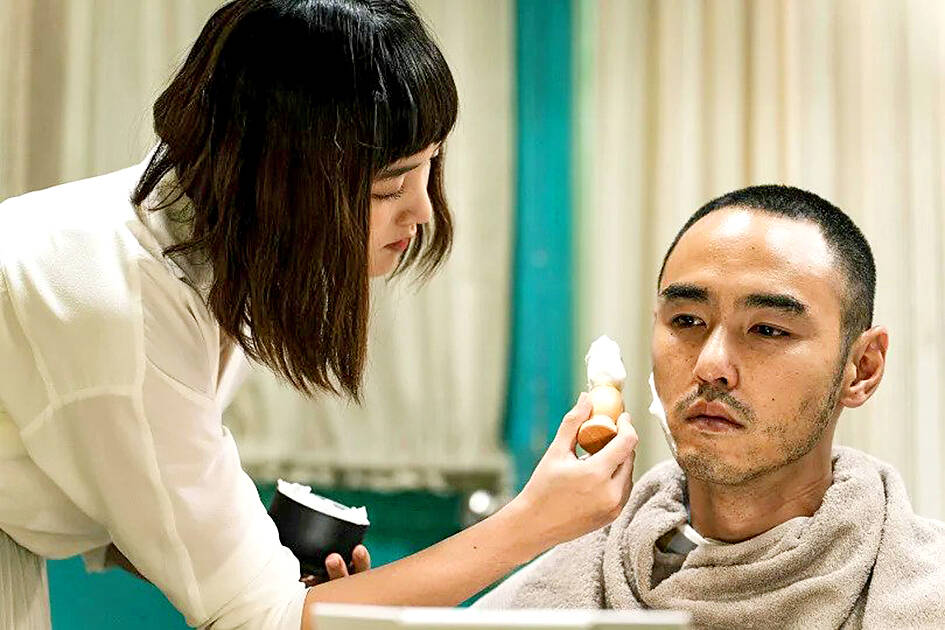Taiwanese cinema’s fascination with gangsters and senseless violence continues with The Pig, The Snake and The Pigeon (周處處三害), inspired by the fifth-century Chinese fable Zhou Chu Eradicates the Three Scourges. This one is a bit different, however, as it minimizes the brotherhood element for a darker tale of a desperate fugitive who will do almost anything to leave his mark on history.
Although there are clear parallels, the folk tale has a very different moral message. Prompted by a villager, local hoodlum Zhou Chu sets out to rid his town of the three evil beings who have been terrorizing the area. After dispatching a vicious tiger, he spends three days battling a dragon. When he prevails and returns, he sees the villagers celebrating as they thought he had died with the dragon. Zhou soon realizes he is the third scourge and decides to change his ways, becoming an upright man of integrity. Eventually he becomes a beloved general who dies on the battlefield.
Protagonist Chen Gui-lin (Ethan Juan, 阮經天), on the other hand, has no such noble intentions. In hiding after committing a series of brazen assassinations of rival gang bosses, he decides (through throwing divination blocks) to turn himself in after learning that his grandmother has died and that he has stage four lung cancer. At the police station, however, he realizes he is just number three on the most wanted list. Wanting to go out in a blaze of glory, and having nothing more to lose with his grandmother gone, he vows to take the top two criminals out first so he can claim the top spot.

Photo courtesy of An Attitude Production Co
“I’m not afraid of death,” he says in one scene. “I’m afraid that people don’t know my name!”
But instead of going on an all-out rampage, the rest of the movie portrays Gui-lin a sympathetic character, despite his shallow motives and violent behavior. His two targets, Hongkie and Lin Lu-he, are convincingly portrayed by Ben Yuen (袁富華) and Chen Yi-wen (陳以文) as depraved, sinister scumbags, making Gui-lin seem almost angelic in comparison as he inadvertently saves others from their tyranny.
Despite his simplemindedness and trigger-happy tendencies, Gui-lin still has somewhat of a conscience, making one want to know more about his backstory; however that isn’t flushed out at all. Instead, too much is focused on unconvincing heart-rending scenes that merely prove that he has a conscience.

Photo courtesy of An Attitude Production Co
These more tender moments are provided by the three characters who interact personally with Gui-lin — the detective on his trail (Lee Lee-zen, 李李仁), his underworld doctor (Cherry Hsieh, 謝瓊煖) and the girl he saves (Gingle Wang, 王淨) — but they’re simply not featured enough to provide enough emotional weight. Still, it’s a compelling character study, and Juan does a great job toeing the line between tragic hero and impulsive madman.
The film is made more entertaining with absurdist elements that soften the violence, though often to the point that many of the scenes are simply not very believable. There are also some interesting twists and symbolism about redemption and rebirth that provide depth to the narrative. It surely has its flaws, but The Pig, The Snake and The Pigeon is still an intriguing take on the gangster genre that smartly avoids relying too much on action scenes to maintain its intensity.

Photo courtesy of An Attitude Production Co

Jacques Poissant’s suffering stopped the day he asked his daughter if it would be “cowardly to ask to be helped to die.” The retired Canadian insurance adviser was 93, and “was wasting away” after a long battle with prostate cancer. “He no longer had any zest for life,” Josee Poissant said. Last year her mother made the same choice at 96 when she realized she would not be getting out of hospital. She died surrounded by her children and their partners listening to the music she loved. “She was at peace. She sang until she went to sleep.” Josee Poissant remembers it as a beautiful

For many centuries from the medieval to the early modern era, the island port of Hirado on the northwestern tip of Kyushu in Japan was the epicenter of piracy in East Asia. From bases in Hirado the notorious wokou (倭寇) terrorized Korea and China. They raided coastal towns, carrying off people into slavery and looting everything from grain to porcelain to bells in Buddhist temples. Kyushu itself operated a thriving trade with China in sulfur, a necessary ingredient of the gunpowder that powered militaries from Europe to Japan. Over time Hirado developed into a full service stop for pirates. Booty could

Lori Sepich smoked for years and sometimes skipped taking her blood pressure medicine. But she never thought she’d have a heart attack. The possibility “just wasn’t registering with me,” said the 64-year-old from Memphis, Tennessee, who suffered two of them 13 years apart. She’s far from alone. More than 60 million women in the US live with cardiovascular disease, which includes heart disease as well as stroke, heart failure and atrial fibrillation. And despite the myth that heart attacks mostly strike men, women are vulnerable too. Overall in the US, 1 in 5 women dies of cardiovascular disease each year, 37,000 of them

Before the last section of the round-the-island railway was electrified, one old blue train still chugged back and forth between Pingtung County’s Fangliao (枋寮) and Taitung (台東) stations once a day. It was so slow, was so hot (it had no air conditioning) and covered such a short distance, that the low fare still failed to attract many riders. This relic of the past was finally retired when the South Link Line was fully electrified on Dec. 23, 2020. A wave of nostalgia surrounded the termination of the Ordinary Train service, as these train carriages had been in use for decades